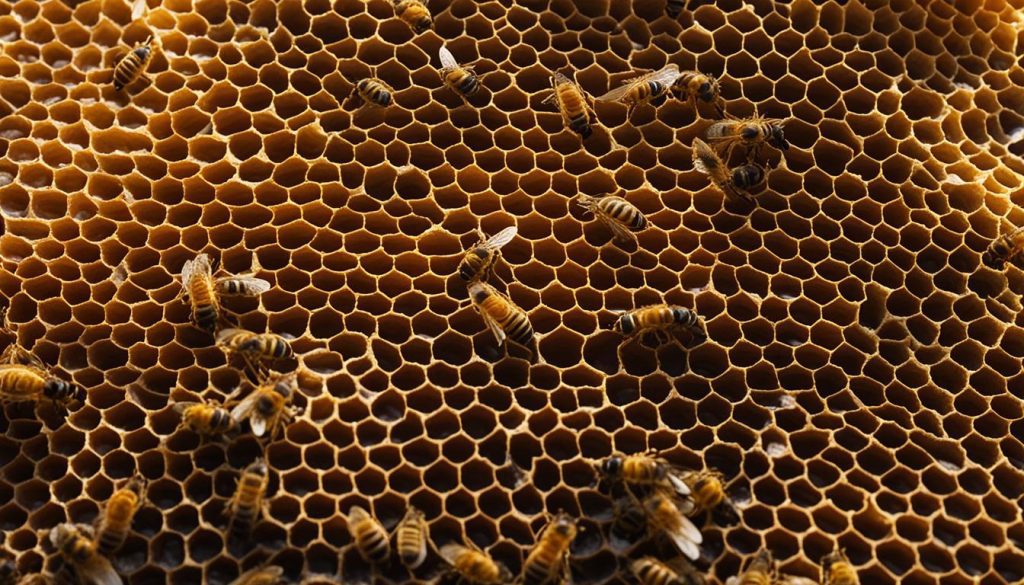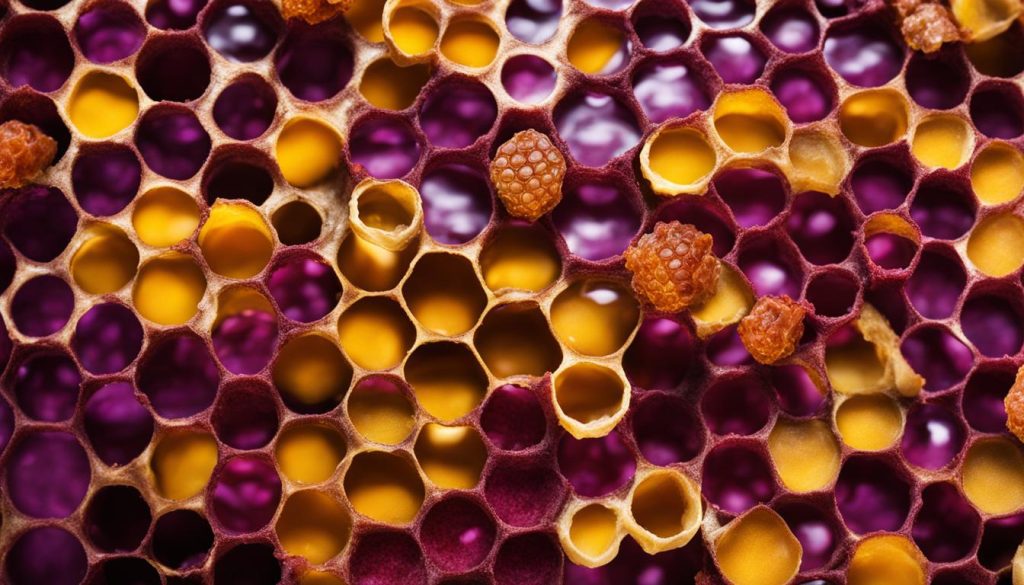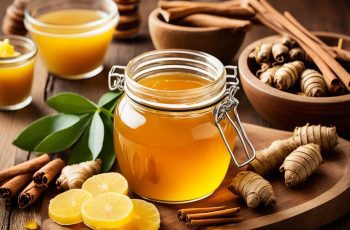When it comes to natural superfoods, honeycomb is a sweet secret that offers a range of health advantages. Not only is it a home for bees, but it also contains a treasure trove of nutrients that can benefit our bodies. Raw honeycomb is packed with proteins, minerals, vitamins, and antioxidants, making it a wholesome addition to any diet. In fact, it is considered healthier than commercial honey due to its unprocessed nature and higher nutrient content.
Raw honeycomb is versatile and can be enjoyed in various ways. Whether you add it to your morning yogurt, spread it on toast, or indulge in a spoonful with some ice cream, the benefits remain the same. This natural sugar substitute can satisfy your sweet tooth while providing a range of nutrients that support overall well-being.
Obtaining raw honeycomb is easier than you might think. You can find it online or directly from beekeepers who take pride in offering their honeycomb straight from the hive.
So why not unlock nature’s sweet secret and discover the health benefits of honeycomb for yourself? Let’s delve deeper into its composition and explore the wonders it has to offer.
Health Benefits of Honeycomb
- Honeycomb is a natural superfood packed with proteins, minerals, vitamins, and antioxidants.
- Raw honeycomb is considered healthier than commercial honey due to its unprocessed nature and higher nutrient content.
- You can enjoy honeycomb by adding it to various foods like yogurt, toast, or ice cream.
- Obtaining raw honeycomb is easy, either online or directly from beekeepers.
- Unlock the health benefits of honeycomb and support your overall well-being.
The Purpose and Composition of Honeycombs
Honeycombs play a vital role in the world of bees and serve multiple purposes. They are not just honey storage units; honeycombs are intricate structures made by bees to store honey, pollen, nectar, and even house the bee larvae.
Raw honeycombs, as the name suggests, are completely edible and consist of hexagonal cells made of beeswax. These cells are the building blocks of the honeycomb and have a unique shape that allows for efficient storage and organization of honey and other bee products.
The composition of honeycombs is diverse and rich in nutrients. The cells house an impressive array of natural substances, including raw honey, bee pollen, propolis, royal jelly, and beeswax. Together, these components create a harmonious blend that forms the foundation of the honeycomb structure.
Unlike commercially processed honey, raw honeycombs are unfiltered and unpasteurized, which means they retain their natural properties and all the goodness within. Raw honeycomb is a powerhouse of proteins, minerals, vitamins, and sugar, making it a wholesome and nutritious food source.
It’s important to note the distinction between raw honeycomb and the processed honey typically found on supermarket shelves. Raw honeycomb offers a unique and authentic taste experience, allowing you to savor the pure essence of honey in its most natural form.
So, the next time you come across a honeycomb, remember that its purpose goes far beyond just storing honey. It is a testament to the intricate workings of nature and the incredible fusion of ingredients that make honeycombs a true gift from bees.

Stay tuned for the next section where we will delve into the various health benefits that honeycombs bring to the table.
Health Benefits of Honeycombs
Honeycombs are not only a delicious treat but also offer numerous health benefits. The raw honey found in honeycombs is a natural powerhouse that can help the body fight against bacteria and fungi, strengthen the immune system, and provide a rich source of antioxidants.
Chewing honeycomb can even improve oral health, acting as a natural chewing gum and promoting the production of saliva. The enzymes and vitamins present in honeycomb can contribute to overall well-being, supporting a healthy lifestyle.
What sets honeycomb apart is its natural properties and composition. It contains raw honey, bee pollen, propolis, royal jelly, and beeswax—all of which offer their own unique health benefits. Unlike processed honey, the raw honey found in honeycombs is unfiltered and unpasteurized, ensuring that it retains its full nutritional value.

The Health Benefits of Honeycombs:
- Fights bacteria and fungi
- Boosts the immune system
- Provides a rich source of antioxidants
- Improves oral health
- Supports overall well-being
It’s worth noting that honeycombs have been used in traditional home remedies for centuries, harnessing the power of its natural properties to address various ailments. Incorporating honeycomb into your diet and lifestyle can be a simple and enjoyable way to take advantage of its health benefits.
Next, we’ll explore the impact of honeycomb on gut health and how it can contribute to a healthy digestive system.
Honeycomb for Gut Health
Honeycomb offers numerous benefits for gut health. Its consumption acts as a prebiotic, nourishing the beneficial bacteria in the digestive system. This process promotes a healthy gut microbiome, which plays a crucial role in overall well-being.
The oligosaccharides found in honeycomb stimulate fermentation in the colon, leading to the production of short-chain fatty acids. These fatty acids support digestion and help prevent stomach diseases, promoting optimal digestive health.
In addition to nourishing the gut microbiome, honeycomb can combat harmful bacteria. By creating a healthy environment in the digestive system, it helps prevent the spread of bacteria that can cause digestive issues.
Honeycomb also has potential benefits for individuals with stomach ulcers. Research suggests that honeycomb has antimicrobial properties and has been found to be effective against Helicobacter pylori bacteria, a common cause of stomach ulcers.
Overall, incorporating honeycomb into your diet can contribute to the health of your digestive system and promote optimal gut health.
How to Consume Honeycomb
Consuming honeycomb is easy. Simply cut off a small piece of the comb and bite into it. The honey will quickly spread in your mouth, leaving a sweet flavor. You can then spit out the small ball of beeswax or choose to swallow it, although beeswax is not edible.
Honeycomb pairs well with a variety of foods. Here are a few delicious ways to enjoy honeycomb:
- Serve honeycomb with soft goat’s cheese for a delightful combination of creamy and sweet flavors.
- Spread Some butter on toast and top it with pieces of honeycomb for a delectable breakfast treat.
- Add honeycomb to your yogurt bowl for a natural sweetener with a satisfying crunch.
- Incorporate honeycomb into your favorite fruit salad or simply enjoy it alongside fresh fruits.
- Indulge in a scoop of ice cream, and drizzle it with honeycomb for a decadent dessert experience.
Experiment with honeycomb and explore various recipes to elevate your dishes. Its unique flavor and texture can add a delightful twist to both sweet and savory creations.
Examples of Honeycomb Recipes:
- Honeycomb and Cheese Bruschetta: Toast baguette slices, spread some soft goat’s cheese, and top with a small piece of honeycomb.
- Honeycomb Yogurt Parfait: Layer yogurt, granola, and sliced fruit in a glass. Top it off with crushed honeycomb for an irresistible parfait.
- Honeycomb and Fruit Skewers: Thread pieces of honeycomb, fresh berries, and melon onto skewers for a refreshing and eye-catching snack.
- Honeycomb Milkshake: Blend milk, ice cream, and chunks of honeycomb for a creamy, honey-infused milkshake.
Get creative in the kitchen and unlock the culinary possibilities of honeycomb. Its natural sweetness and unique texture make it a versatile and exciting ingredient to experiment with.
Honeycomb for Health and Beauty
Honeycomb offers numerous benefits for both internal health and external beauty. It’s not just a delicious treat for your taste buds, but it can also do wonders for your skin and hair. The natural moisturizing and antibacterial properties of honeycomb make it highly effective in nourishing the skin, leaving it soft, supple, and glowing with health.
When applied topically, honeycomb can help to moisturize and hydrate the skin, reducing dryness and promoting a youthful complexion. Its natural antibacterial properties make it excellent for acne-prone skin, as it can help to fight off bacteria and reduce inflammation. Whether you have dry or oily skin, incorporating honeycomb into your skincare routine can help to balance the skin’s natural oils and improve overall skin health.
But the benefits of honeycomb don’t stop at the skin. It can also work wonders for your hair. Honeycomb is known for its ability to enhance hair health and increase natural shine. Applying honeycomb-infused hair masks or rinsing your hair with honeycomb-infused water can help to nourish the strands, reduce frizz, and improve overall hair texture. It can even help to stimulate hair growth and prevent hair loss.
In addition to its skincare and haircare benefits, honeycomb is also widely used in the field of wound healing. Its natural antibacterial properties and ability to promote tissue regeneration make it an excellent choice for treating minor cuts, scrapes, and burns. The enzymes present in honeycomb help to accelerate the healing process and prevent infections, making it a great natural remedy for wound care.
So the next time you enjoy a delicious piece of honeycomb, remember that it’s not just a sweet treat. It’s also a natural beauty secret and a powerful healer. Incorporating honeycomb into your beauty routine can help promote healthy, radiant skin and hair, while also providing soothing relief for wounds and skin ailments.
Conclusion
Honeycomb is truly a superfood that offers a wealth of nutrients and health benefits. As a natural and unprocessed source of honey, bee pollen, propolis, royal jelly, and beeswax, it provides a potent combination of essential substances for our well-being. Consuming raw honeycomb can have a profound positive impact on our immune system, gut health, and overall vitality. The antioxidants found in honeycomb offer additional protection against harmful free radicals, promoting a healthy body and mind.
Not only is honeycomb beneficial when consumed internally, but it also has applications in skincare and haircare. Its moisturizing and antibacterial properties make it an excellent addition to our beauty routines, leaving our skin nourished and our hair lustrous. The use of honeycomb in skincare products and home remedies can support wound healing and promote a radiant complexion. Embracing the health benefits of honeycomb allows us to tap into nature’s sweet secret and nourish ourselves inside and out.
Incorporating honeycomb into our daily lives is a simple yet powerful way to enhance our well-being. Whether enjoyed as a natural sweetener, a delicious addition to recipes, or an ingredient in beauty rituals, honeycomb provides us with a versatile and nutrient-rich superfood. By reaping the benefits of eating honeycomb, we can support our immune system, improve our digestive health, and enjoy a natural source of antioxidants. Let us savor this golden gift from the bees and indulge in the magic of honeycomb, a true superfood for a vibrant and wholesome life.
FAQ
What are the health benefits of honeycomb?
Honeycomb is packed with nutrients and offers a range of health benefits. It can boost the immune system, provide antioxidants, support gut health, and promote overall well-being.
What is the purpose and composition of honeycombs?
Honeycombs serve as a storage space for honey, pollen, nectar, and bee larvae. They are composed of hexagonal cells made of beeswax and contain raw honey, bee pollen, propolis, royal jelly, and beeswax.
How can honeycomb benefit my health?
Honeycomb can help fight bacteria and fungi, boost the immune system, provide antioxidants, improve oral health, and support overall well-being due to its high content of vitamins, minerals, and enzymes.
Can honeycomb improve gut health?
Yes, consuming honeycomb can promote gut health. Its prebiotic properties nourish beneficial bacteria, aid digestion, and prevent stomach diseases. Honeycomb can also help create a healthy microbiome and fight Helicobacter pylori bacteria.
How do I consume honeycomb?
To enjoy honeycomb, simply cut off a small piece and bite into it. The honey will quickly spread in your mouth. You can spit out the beeswax or choose to swallow it. Honeycomb pairs well with various foods, such as cheese, toast, yogurt, fruits, and ice cream.
Are there any benefits of honeycomb for skin and hair?
Yes, honeycomb offers benefits for skin and hair. Its natural moisturizing and antibacterial properties can nourish the skin, leaving it soft and supple. Honeycomb can also enhance hair health and shine.
Is honeycomb a superfood?
Yes, honeycomb is considered a superfood due to its nutrient content and health benefits. It provides raw honey, bee pollen, propolis, royal jelly, and beeswax, making it a natural and unprocessed source of various beneficial compounds.




